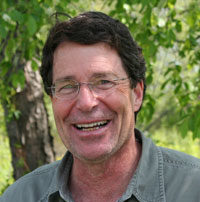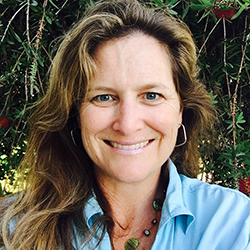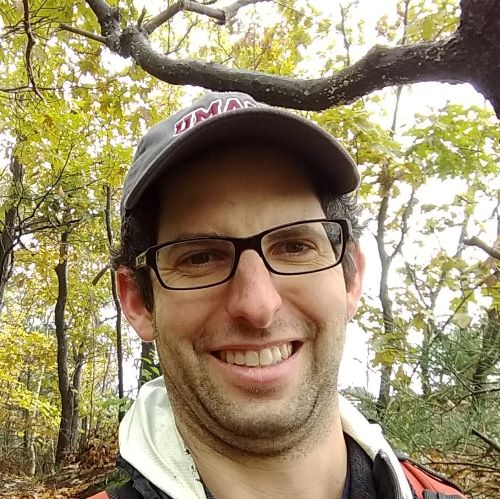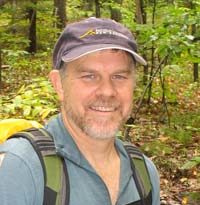Master of Science
MS in Environmental Studies, Science Teaching and Learning
Be an active part of a new vision for science education!
Awaken or renew your passion for science education that is experiential, investigative, ethical, and transformative: a program for new and experienced educators. Learn to work with learners to explore compelling scientific phenomena and classroom and community-based problems. Infuse and integrate science education with interdisciplinary environmental studies. Learn to develop playful, active, rigorous student-centered, attentive science classrooms where students design scientific investigations to explore intriguing questions. Design and teach problem-solving and inquiry-based lessons, and develop learning-centered units on science topics of your choice. Teach experiential science lessons to middle and high school students. Develop an online professional teaching portfolio that will enable entry and support for careers in science education.
Antioch’s New England campus offers this degree, available online and in person.


“I have always been drawn to nature in a way that was beyond recreation….the connection was always spiritual. By the time I was in high school, I was ready to devote myself to her protection as a career,” she says. “[We need] to center the voices, needs, and experiences of Black, Indigenous, and other People of Color in the environmental movement….I’d like to permanently flip the paradigm of what it means to do environmental work in this country.”
Nia Keith ’09
Vice President for Diversity, Equity, Inclusion, and Justice (DEIJ), Mass Audubon
Try Us Out
Wondering if Antioch ES MS is right for you? Prospective students can earn up to three credits in a semester at a highly reduced rate. These credits are transferable into the ESMS degree.
Program Overview
This program roots science teaching in our own observations, inquiry, and explorations of science, teaching, and learning. In doing what scientists do, with minds-on and hands-on activities, we grow our understanding of what it means to create and develop practical and enduring engagements with the subject matter of science. This program also lays the groundwork for approaching science education as an ethical enterprise and vocation. Because you will be earning an MS in Environmental Studies, you can pursue both formal (e.g. teaching in schools) and non-formal education careers (e.g. teaching and leadership in summer camps, outdoor adventure programs, science museums, nature centers, and environmental learning centers).
Degree Requirements
Length of Program:
The coursework for this program can be completed in 5 semesters. The program aims to provide expanded access nationally and internationally with in-person residencies & fieldwork, and online courses. Classes are held on Thursdays, Fridays, and on occasional weekends. Full-time student teaching can take place almost anywhere in the country during the final semester.
Coursework:
The MS in Environmental Studies degree requires a minimum of three semesters and 36 credits. The degree may be completed fully virtually, through online learning, or partially virtually, and through on-campus and field studies courses. A few commonalities across all the Environmental Science degree concentrations are apparent as students look through the following requirements and descriptions. All MS degrees have a combination of coursework and application in the field.
Learning Opportunities
If you are not ready to begin a Master’s Program but are ready to start learning, we have several options available. If you then decide to enter a Master’s Program, you will be able to use these credits or certifications in your degree program.
Certificates
Additional Information
You will complete a 3-credit capstone in the form of a master’s project, thesis, collaborative service initiative, or a 2nd professional internship.
Capstone Project (choose one of the capstone options below):
Master’s Project: Typically a descriptive, applied independent research project. Students can address a sustainability challenge in their home community or international area of interest by identifying and developing a solution. Applied GIS projects also can serve as capstones. Recent MS projects include: Proposal for Angola’s Energy Transition: Assessing Conditions and Governance Dynamics; and Analysis of River Corridor Erosion and Soil Loss in the Town of Bernardston, Massachusetts.
Master’s Thesis: Typically an independent empirical research project. Recent MS Theses include: How Is Energy Justice Built Into Community Choice Aggregation? A Comparative Case Study of the Lowell Community Choice Power Supply Program and Cape Light Compact, Massachusetts; The effect of salt marsh restoration on shellfish populations in the Gulf of Maine.
Collaborative Service Initiative: The Collaborative Service Initiative (CSI) is designed to provide an opportunity for outside organizations to work with a team of 2-4 ESMS graduate students who apply their knowledge and skills to an external project that needs to be solved in the community. Projects include developing a place-based education program for a local school system, conducting applied ecological and social research, exhibit and curriculum design, energy and materials management, program/organization evaluation, curriculum and program evaluation, and other consultation projects.
Culminating Professional Internship: After consultation with their Academic Advisor, students may choose to complete a second internship in order to gain more professional experience in their field. Students who choose a second internship should consider how this second professional internship will serve as a launch pad for their post-graduate next step. As a capstone, the experience should be robust, offer significant networking opportunities, and enhance their skill set in new and challenging ways.
Combine your MS in Environmental Studies with Peace Corps service. Through the International Service Program, you can earn credit for your service, apply what you are learning to create positive change across the world and save thousands of dollars on your degree.
You should expect to spend approximately nine hours per week on each 3-credit course and 20-35 hours a week when your practicum and professional internships begin. We encourage you to plan your life carefully to accommodate the increased investment of time and energy in your professional education.
Yes, you can complete this degree fully online. These courses are synchronous and, in some cases, asynchronous. Virtual synchronous course class sessions are offered one evening during the week (Monday-Thursday evenings, ET) and on weekends. You can also choose to take courses with us in person, including field-based courses and campus-based intensives.
Students in AUNE’s Environmental Studies Master of Science (ESMS) program can choose to earn the Professional Science Master’s (PSM) designation for their degree. Learn more at the Professional Science Master’s website.
The program typically takes students five (5) semesters (20 months) to complete if attending full-time . Students who attend part-time can anticipate approximately three (3) years to complete the program. For Fulbright Scholars and those who want an accelerated path, it is possible to complete the degree in three (3) semesters (12 months).
Our graduates teach life, physical, earth, and environmental science in schools and non-formal settings and instill their curricula with environmental studies, sustainability, and ecological orientations. For years, AUNE’s Science education graduates seeking teaching roles have been hired as science teachers. This is not a teacher licensure program for public schools. Teachers not possessing a teaching license who wish to teach in public schools should contact the Department of Education in their home state about alternative licensure pathways (e.g. site-based license). Science teaching and learning graduates can also direct after-school programs, direct and/or teach in environmental camps and outdoor leadership programs during their summer breaks, as well as write environmental and ecology curricula.
Faculty Spotlights

Michael Simpson, MS, MALS
Core Faculty

Dawn Murray, PhD
Core Faculty

Michael Akresh, PhD
Core Faculty,Co- Director

Peter Palmiotto, PhD
Core Faculty, Co-Director
Admissions / Cost / Aid
How to Apply
- Complete the online admissions application, including:
- Essay questions, admissions, and program-specific questions
- Resume/curriculum vitae (CV)
- Non-refundable $50 application fee
- Submit official transcripts from all colleges or universities where you earned a degree or certificate.
- email transcripts to [email protected], or
- mail to: Office of Admissions Antioch University New England 40 Avon Street Keene, NH 04341-3516
- Two letters of recommendation are required, from people who are in a position to evaluate your professional or academic work. The person making the recommendation may not be related to you.
- There are additional requirements for International applicants.
- Interview with a faculty member of the department to which you seek entry if selected. This can be in person, by phone, or via Skype.
Official transcripts should be emailed to [email protected] or mailed to: Office of Admissions Antioch University New England 40 Avon Street Keene, New Hampshire 03431-3516 All application materials submitted become part of an applicant’s file and cannot be returned.
Application Deadlines
Antioch University New England processes applications for most programs on a rolling basis, so we encourage you to apply as early as possible. All application materials should be received in Admissions by the dates listed below. If you have any questions, please contact the Admissions Department. Environmental Studies Master’s Programs:
| Program | Term | Deadline |
|---|---|---|
| MS Environmental Studies (All Concentrations) | Fall | July 15 |
| Spring | December 1 |
LEARN MORE ABOUT OUR ADMISSION PROCESS
Criminal Record Checks
NH state law [RSA 189:13-a(IX)(b)] requires criminal history record checks, for students who enroll in an educator preparation program at an institution of higher education. Additional criminal history record checks, administered by the placement district(s), are required for student teachers and interns. Additionally, local school districts may require a background check prior to the start of any field experience, and students must comply with the local policies. The cost of all background checks are out-of-pocket costs borne by the student. Your AUNE admissions counselor will provide you with the correct form for your area.

Start your Antioch Journey
Take your next step – talk to our admissions team to find the right program for you.


